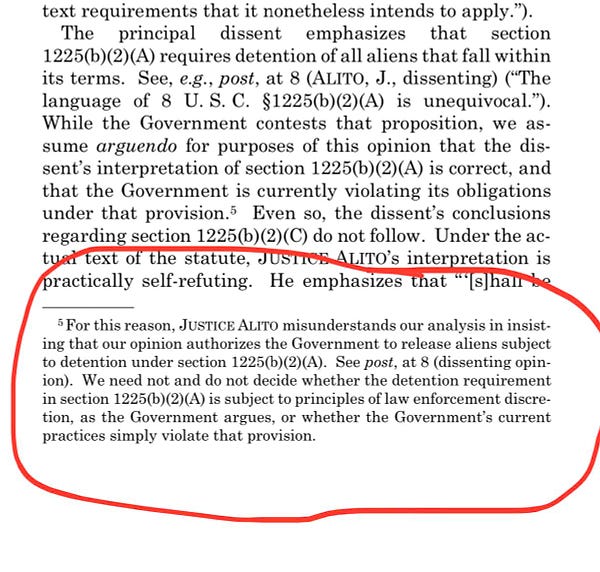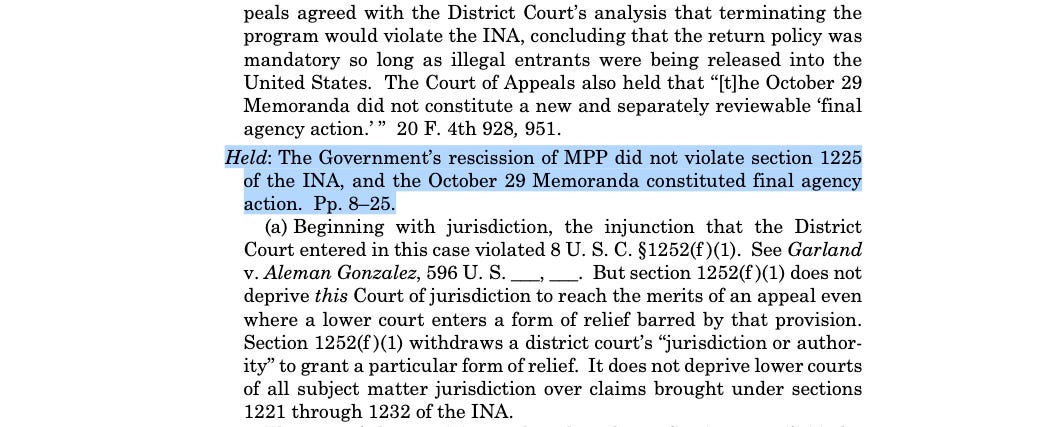The Migrant Protection Protocols (MPP) may be coming to an end after the Supreme Court ruled that the Biden administration did not unlawfully terminate the program in their ruling on Biden v. Texas this morning.
MPP, a program that requires asylum seekers to wait in Mexico for their asylum hearings, has led to extremely low rates of legal representation and positive determinations of asylum and has been criticized by national and international organizations for undermining the asylum process along the US-Mexico border.
Under the court-ordered re-implementation of Remain in Mexico (i.e. MPP 2.0), TRAC recently found the following:
From December 2021 through May 2022, over 5,114 asylum seekers have been required to remain in Mexico under the current implementation of the MPP 2.0 while awaiting their Immigration Court hearings.
The monthly number of migrants added to MPP has grown from 129 in December 2021 to 2,008 in May 2022
Only 1,109 of the 5,114 cases in MPP 2.0 have been completed
Only 27 people have received asylum so far, or 2.4% of the completed cases. Over the same time period, 50% of asylum seekers who were not in MPP were successful.
81% of the 129 cases added to MPP in December 2021 had been completed, which nearly meets the administration’s 180-day timeline.
The immigration court in Brownsville, Texas, has the most MPP cases: 2,752 in total. That’s more than half of all MPP cases.
Only 5% of asylum-seekers in MPP 2.0 have found attorneys.
Although the Supreme Court ruled in favor the government, there are still many unanswered questions about the future of MPP.
For one, even though it appears that the Biden administration is finally allowed to end the program, the case will also go back to the lower courts. I don’t understand all of the legal contingencies that are still possible so I won’t comment on them. But suffice it to say that we should not interpret this decision as the absolute end of the line for the case. To borrow from Princess Bride, MPP appears to be only “mostly dead” and we cannot completely discount the possibility of future surprises.
Moreover, likely undeterred by this ruling and bolstered by other conservative rulings this cycle, I would not be surprised if we see further creative litigation from conservative states related to this or other border-related policies. There may be cases sitting on someone’s desk in Texas just waiting to get filed in case of this outcome, which means the battle over the future of asylum in the United States is far from over.
Even more immediately, we also still don’t quite know all of the implications of the decision in this case, and it will take a few days for the policy experts to get through all the nooks and crannies. Michael Kagan, for instance, has already pointed out how the question about the use of prosecutorial discretion in immigrant detention remains open.


Finally, The future for asylum seekers currently under MPP cases remains uncertain, as additional legal developments unfold. Over 5,100 asylum seekers were added to MPP 2.0 since December and most of those cases are still pending. It’s unclear what—if anything—the Biden administration will do or can do for those individuals if, in fact, they are able to effectively wind down the program. The last time around, the Biden administration permitted people with pending cases to enter the country, but whether they will do that again (and whether they will be sued again if they do) remains a question.
For a closer but still quick read of the case, see Aaron Reichlin-Melnick’s thread here:


Support public scholarship.
Thank you for reading. If you would like to support public scholarship and receive this newsletter in your inbox, click below to subscribe for free. And if you find this information useful, consider sharing it online or with friends and colleagues.







This is so helpful, thank you for this breakdown.
I am interested in your thoughts on whether this decision makes it easier for a future Trump/DeSantis Admin take executive action without push back from courts.
Also I wonder the impact on injunctions as this decision, I think, had something to say about national injunctions.
PS - I might have gone with the Holy Grail “I’m not dead yet” versus Princess Bride!